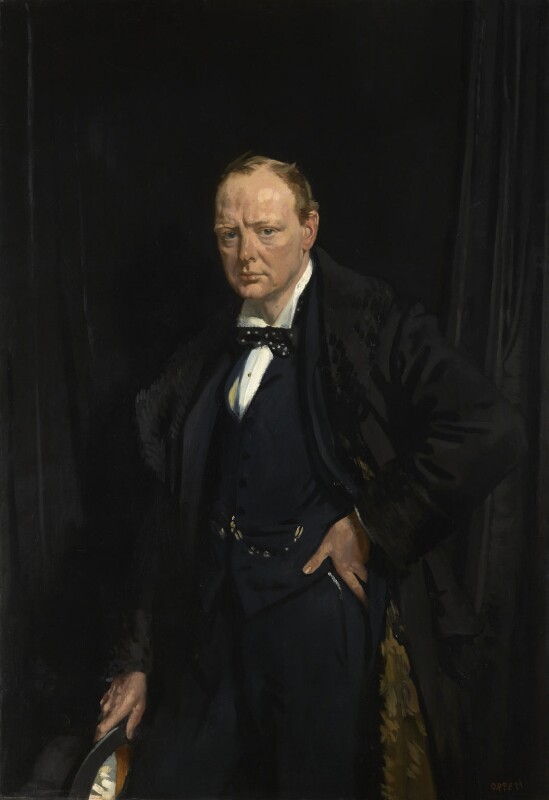
Finest Hour 196
“A Very Serious Responsibility”

Churchill by Sir William Orpen, 1916
June 14, 2023
The Birth of the Modern Middle East
Finest Hour 196, Second Quarter 2022
Page 38
By Winston S. Churchill
On 14 June 1921, Secretary of State for the Colonies Winston Churchill delivered a major statement in the House of Commons explaining the actions the Government had taken in the settlement of the Arab territories under British authority since the end of the First World War. Here follow extracts.
I must take as my starting point this afternoon, the obligations and responsibilities into which this country has entered in the Middle East, and which, in accordance with the policy of the Government, I am endeavouring to discharge. During the War our Eastern Army conquered Palestine and Mesopotamia. They overran both these provinces of the Turkish Empire. They roused the Arabs and the local inhabitants against the Turks. We uprooted the Turkish administration, and, as the Army moved forward, set up a military administration in its place. In order to gain the support of as many of the local inhabitants as possible, pledges were given that the Turkish rule should not be reintroduced in these regions….
Secondly, in order to gain the support of the Arabs against the Turks, we, in common with our Allies, made during the War another series of promises to the Arabs. We made them, through King Hussein and those who gathered round him, for the reconstitution of the Arab nation, and, as far as possible, for a restoration of Arab influence and authority in the conquered provinces, or, as we term them, the liberated provinces. There is no doubt about these pledges either.
In regard to Palestine, a third promise of a very important character was made, on behalf of the Government, by my right hon. Friend the President of the Council (Mr. Balfour), on 2nd November, 1917, that Great Britain, if successful in the War, would use her best endeavours to establish a Jewish national home in Palestine. Such was the position, and such were our obligations when the War came to an end.

2024 International Churchill Conference
After the fateful period of the War, we entered upon the painful period of the peace negotiations. The principles governing the disposal of the conquered Turkish provinces and of the German Colonies among the victorious Allies were decided by the Supreme Council sitting in Paris during 1919, and their conclusions were embodied in the Treaties of Versailles and Sèvres and in the Covenant of the League of Nations. These treaties were approved on behalf of Great Britain by the War Cabinet of those days, and their provisions have been accepted or acquiesced in by Parliament.
Under decisions arising out of these Treaties we have solemnly accepted before the whole world the position of mandatory Power for Palestine and Mesopotamia. That is a very serious responsibility. It is not only a formal responsibility; it is an actual responsibility. We are at this moment in possession of these countries. We have destroyed the only other form of government which existed there. We have made the promises that I have already recited to the inhabitants, and we must endeavour to do our duty, to behave in a sober and honourable manner, and to discharge obligations which we entered into with our eyes open.
We cannot repudiate light-heartedly these undertakings. We cannot turn around and march our armies hastily to the coast and leave the inhabitants, for whose safety and wellbeing we have made ourselves responsible in the most public and solemn manner, a prey to anarchy and confusion of the worst description. We cannot, after what we have said and done, leave the Jews in Palestine to be maltreated by the Arabs who have been inflamed against them, nor can we leave the great and historic city of Baghdad and other cities of Mesopotamia be pillaged by the wild Bedouins of the desert. Such a proceeding would not be in accordance with the view the British Parliament has always hitherto taken of its duty, nor would it be in accordance with the reputation that our country has frequently made exertions to deserve and maintain.
It is no use consuming time and energy at this stage in debating whether we were wise or unwise in contracting the obligations I have recounted. Moving this way and that way in the agony of the great War, struggling for our lives, striking at our enemies, now here and now there, wherever it was thought best, we eventually emerged victorious in arms and encumbered with the responsibilities which so often attach to the victor. We are bound to make a sincere, honest, patient, resolute effort to redeem our obligations, and, whether that course be popular or unpopular, I am certain it is the only course which any British Government or British House of Commons will in the end find itself able to pursue….
As soon as I had completed, in January, the formation of a Middle Eastern Department, I endeavoured to work out a policy of reduction [in expenditure] by cable with the military and civil authorities in Mesopotamia. I failed entirely to make any progress as long as discussions were conducted entirely by cable. I therefore, with the assent of the Cabinet, went to Cairo and convened a conference of British authorities concerned in the affairs of the Middle East. What it had been impossible to arrange by telegraph proved quite easy to settle by conference and discussion.
Whether the conclusions we reached will be justified by events, I cannot tell, but at any rate they were conclusions which were reached unanimously by all the very important and varied experts there, and they will achieve, if they succeed, the essential condition of reduction which I set before myself as the paramount object. But at any rate within the whole of the Arabian Peninsula, and throughout the whole of that great area, we have a single clear policy upon which all the authorities, military and civil, are at the present time agreed.
Subscribe
WANT MORE?
Get the Churchill Bulletin delivered to your inbox once a month.




